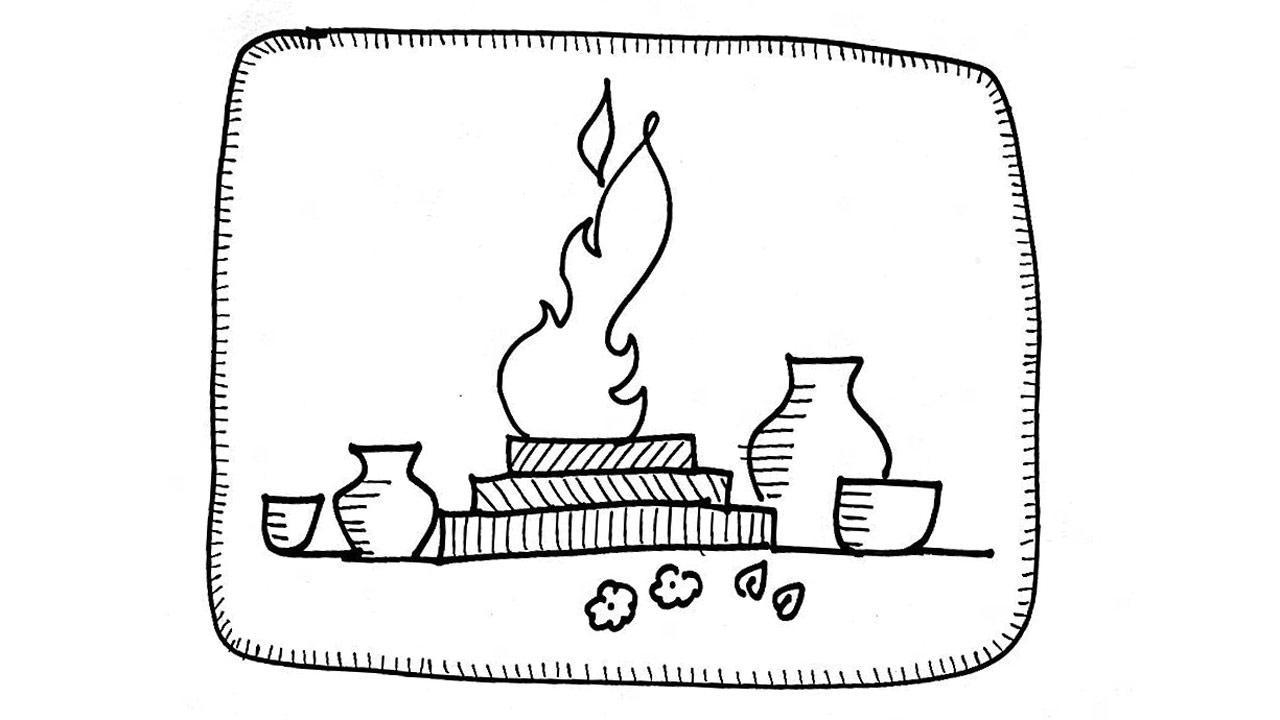Much like modern poets, the ancient poets survived because of patronage

Illustration/Devdutt Pattanaik
 Many today think of the Vedic mantras as cosmic vibrations. But they are, in fact, Sanskrit poetry composed by thoughtful, sensitive and creative human beings. The purpose of the words was to get the gods in the sky to come down to earth, engage with humans, receive the offerings and give fortune in return. It is a simple transaction—what we call “yagna”. Transactions are the hallmark of civilised human conduct. The opposite of transaction is extraction and exploitation of one group by another.
Many today think of the Vedic mantras as cosmic vibrations. But they are, in fact, Sanskrit poetry composed by thoughtful, sensitive and creative human beings. The purpose of the words was to get the gods in the sky to come down to earth, engage with humans, receive the offerings and give fortune in return. It is a simple transaction—what we call “yagna”. Transactions are the hallmark of civilised human conduct. The opposite of transaction is extraction and exploitation of one group by another.
ADVERTISEMENT
Much like modern poets, the ancient poets survived because of patronage. If gods received poems, and patrons received fortune, the poet received payment. Thus, we have many Vedic dana-stutis or “hymns in praise of donors”. These hymns recount the gifts or donations received from a chieftain, usually those gifts they receive after victory in war. The bard or a seer would have consecrated the weapons used in the war as well as provided battle charms. In exchange, they usually received cattle, horses, utensils, grain and even women. This was happening in the North Indian river basins 3,000 years ago.
Around 2,000 years ago, in the South Indian river basins, we have Sangam poems, in Tamil, which are of a decidedly different flavour--not addressed to gods but to humans, love songs or “akam” and war songs or “puram”. Much like the Vedic bards, these Sangam poets were also wandering minstrels, asking chieftains for rewards.
These poems are quite different. For example, if you read the Vedas, the Brahmanas, and the Upanishads, you notice the lack of women, and very few goddesses. But in Sangam literature, the women pop up-front, as wives, mothers, sisters, daughters. However, they do make a distinction between akam and puram, with the women associated with the former, the world emotions and home, and the men are associated with the latter, the world of power and war.
Sangam poets were given food by their patrons: roasted meat and toddy. There are songs praising chieftains who are generous, just like dana-stuti. There are also poems that warn about dangers of being too close to the generous but thoughtless kings, who can give a poor poet a wild elephant and think nothing of it.
If Vedic poets were venerated, Sangam poets were seen as inferior. They were drummers, service-providers, entertainers. Not magicians who could determine the fortune of war.
Sangam poets were familiar with the Vedic world that percolated to the south from the north. They refer to Brahmins and fire rituals. But, not much about caste. There is reference to old forms of community groupings, hierarchy, and even ideas of purity and pollution, linked to women, and to those who lived on the edges of the village, near crematoriums, protecting the settlement from ghosts. These southern ideas would shape
Hindu practices, much as Vedic ideas would. But Brahmins remember Vedic poets, not Sangam poets. Praising patrons was key to survival for both Vedic and Sangam poets. Later, when kingship rose, we find court poets like Bana and Kalidasa and Ravikirti praising kings in epic ballads and composing ‘prashasti’ or inscriptions of royal praise on rocks and copper plates. Even today, we find journalists and public intellectuals and filmmakers do that—praise those with money and power, for a fee.
Devdutt Pattanaik writes and lectures on the relevance of mythology in modern times. Reach him at [email protected]
 Subscribe today by clicking the link and stay updated with the latest news!" Click here!
Subscribe today by clicking the link and stay updated with the latest news!" Click here!







